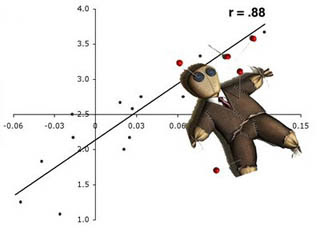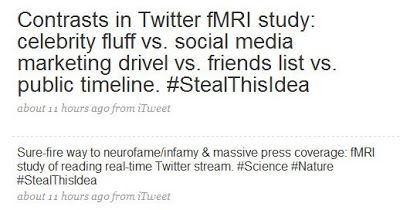Nominees for the 2009 3QD Prize in Science
 3 Quarks Daily 2009 Science Prize: Vote HereFor details of the prize you can look at the announcement here, and to read the nominated posts you can go here for a complete list with links. Voting ends at midnight on June 8, 2009.
3 Quarks Daily 2009 Science Prize: Vote HereFor details of the prize you can look at the announcement here, and to read the nominated posts you can go here for a complete list with links. Voting ends at midnight on June 8, 2009.Four posts from The Neurocritic were nominated:
- The Neurocritic: Intersex (for lack of a better word)...
- The Neurocritic: Mirror Neurons Control Hard-ons?
- The Neurocritic: The Neurology of Twitter
- The Neurocritic: Voodoo Correlations in Social Neuroscience
Which one do you like best, dear readers? Please reply in the comments and vote online at 3QD. Of these, Voodoo Correlations in Social Neuroscience is currently in the lead with a grand total of 2 5 9 18 votes [I know, very sad] so why not you cast your vote for that entry? Any and all votes will be greatly appreciated! [but you can only vote once, so make it count.]

The voodoo post was one of many to highlight the controversial paper by Ed Vul and colleagues, since renamed "Puzzlingly High Correlations in fMRI Studies of Emotion, Personality, and Social Cognition" (PDF). The authors questioned the implausibly high correlations observed in some fMRI studies in the field of Social Neuroscience. A new look at the analytic methods revealed that over half of the sampled papers used faulty techniques to obtain their results. The authors' early online release of the accepted manuscript, combined with spirited debate in the blogosphere, caused many to praise (and damn) the role of blogs in discussing and critiquing peer-reviewed scientific literature.
Posts from other psych/neurobloggers were nominated as well, including entries from A Blog Around the Clock, Bioephemera, Cognitive Daily, Neurophilosophy, and Neurotopia. All excellent blogs.
Here, however, I would like to highlight three entries from blogs outside the ScienceBorg:
World of Psychology: Top Ten Online Psychology Experiments
NeuroWhoa!: Believer Brains Different from Non-Believer Brains?
The Mousetrap: Major conscious and unconscious processes in the brain: part 4: the easy problem of A-consciousness
More on the contest from 3QD:
Results of the voting round (the top twenty most voted for posts) will be posted on the main page on June 8, 2009. Winners of the contest, as decided by Steven Pinker, will be announced on June 21, 2009.Let's conclude with an excerpt from The Neurology of Twitter:
So why don't we do an experiment to see exactly what happens to the brain while reading Twitter streams in real time? The purpose and the methods of the study are summarized below.

- Voodoo Correlations: Two Years Later
The end of 2008 brought us the tabloid headline, Scan Scandal Hits Social Neuroscience. As initially reported by Mind Hacks, a new "bombshell of a paper" (Vul et al., 2009) questioned the implausibly high correlations observed in some fMRI studies in...
- A Modest Appeal To Research Bloggers
ResearchBlogging.org is having a contest to determine the Best Blogging on Peer Reviewed Research. The Neurocritic has been chosen as a finalist in the Best Blog -- Neuroscience category.* I kindly thank the judges for nominating my blog for this award....
- The Paper Formerly Known As "voodoo Correlations In Social Neuroscience"
Voodoo no more! The paper everyone loves (or loves to hate) has a new name.1 Through a number of channels [The Chronicle of Higher Education via @vaughanbell, Ed Vul's website, and Neuroskeptic], The Neurocritic has learned that the "Voodoo Correlations"...
- Voodoo Counter-counterpoint
In today's Weekday Update, The Neurocritic is pleased to present an excerpt from Vul et al.'s rebuttal to Jabbi et al.'s rebuttal to the lively and controversial paper by Vul, Harris, Winkielman, and Pashler (PDF). The intro, main bullet...
- We've Been Nominated!
The team at ResearchBlogging.Org and Seed Media Group are honouring the best bloggers who discuss peer-reviewed research in the first Research Blogging Awards. Over 400 nominations were made, and an expert panel of judges have whittled them down to 5-10...
